Warsaw Historical Timeline
more than a year ago
1569 Poland and Lithuania are united and parliament shifts from Kraków to the more centrally located Warsaw.
1596 King Sigismund III Vasa moves his court to Warsaw.
1655 - 1660 sees prolonged warfare with Sweden.
1700 - 1721 The Great Northern War sees Polish forces run ragged by the Swedes and Russians.
1764 Stanisław August Poniatowski becomes king. His finest hour comes in 1791 with the signing of a constitution that promises sweeping reforms. Russia invades in 1792 to quash the constitution and in 1793 the Second Partition of Poland promises the end of the Polish state.
1795 Austria, Russia and Prussia impose a third partition of Poland, effectively ending Polish independence.
1807 Napoleon’s troops enter Warsaw and a semi-independent Duchy of Warsaw is created. Following the collapse of Napoleon’s campaign in Russia, the 1815 congress of Vienna rules that Warsaw is to come under Imperial Russian tutelage, effectively wiping Poland off the map for over a century.
November 23, 1830 An armed uprising in Warsaw takes the Russians until September 1831 to crush.
1863 - 1864 Citizens of Warsaw again try and fail to topple the governing Russian government in what becomes known as the January Insurrection. Warsaw flourishes for the next half a century under Mayor Starykiewicz.
1918 The end of World War I leads to the collapse of the partitioning powers. Polish hero Józef Piłsudski is released from detention in Germany and assumes control of Poland. Warsaw is once again the capital of an independent Poland.
1920 Bolshevik troops invade Poland, but are beaten back after the epic Battle of Warsaw, effectively saving post-WWI Europe from the Red Army.
1921 The foundation of the first modern Polish constitution and beginning of what is commonly called the 2nd Polish Republic.
1939 August 23 The Molotov-Ribbentrop Pact is signed. Based around Soviet/German non-aggression it effectively carves Poland up between the two. Poland is invaded on September 1, with the first gunshots fired on the Westerplatte Peninsula in the north, signalling the start of WWII. On September 17 the east of Poland is invaded by the USSR and Warsaw capitulates 11 days later on the 28th.
1944 August 1 Poland’s Home Army launches the Warsaw Uprising with the intention of liberating Warsaw from Nazi occupation. It ends in defeat two months later with the city in ruins.
1945 January 17 Soviet and Polish units enter the rubble of Warsaw. Total destruction stands at 84%, civilian losses are estimated at over 700,000.
1945 Business is nationalized and political and religious leaders are imprisoned. With much of the capital, Warsaw, in ruins, Łódź is used as Poland’s temporary capital until 1948. In 1947 the Communists consolidate a political monopoly after rigged elections. In 1955 the Warsaw Pact is created and Warsaw’s Palace of Culture is completed.
Władysław Gomułka becomes Poland’s premier in 1956 and a political thaw begins. Events in Gdańsk are the first to rock the system; protesting about plunging living standards workers at the Lenin Shipyards call a strike in 1970, with the army promptly called in to intervene. Bloody clashes lead to the deaths of 44 workers, and ultimately force Gomułka out of power. The late 1970s witness a dramatic drop in living standards and spiralling prices; a half-mad economic policy propped up by foreign loans is exposed as useless. 1978 sees Cardinal Karol Wojtyła elected as Pope and taking the name John Paul II. The following year he returns for a nine day tour of his native Poland in what is regarded by many as the pivotal point in the collapse of communism. Preaching 32 sermons in nine days his brief return offers hope and unity to Poles, and lights the flame that will later explode in the Solidarność (Solidarity) revolution.
1980 A general strike is called in August by the fledgling Solidarność trade union, led by shipyard electrician Lech Wałęsa.
1981 Martial law is declared by the Minister of Defence General Jaruzelski on December 13.
1982 Solidarność is outlawed by the government.
1983 Martial law is lifted in July and most political leaders released from prison. Lech Wałęsa receives the Nobel Peace Prize.
1985-88 Soviet leader Mikhail Gorbachev’s perestroika reforms initiate a period of liberalization, though economic crisis and popular frustration continue to deepen.
1989 Following more strikes Solidarność is legalized. Partly free elections are held. Solidarność sweeps the elections and the Communist regime collapses.
1990 Lech Wałęsa becomes the first popularly-elected president of post-Communist Poland.
2004 Poland enters the European Union on May 1, 2004 sparking a mass exodus of young Poles seeking their fortune.
2005 April 2nd Following a long battle with illness Pope John Paul II passes away. His funeral in the Vatican is attended by a million Poles.
2007 Platforma are voted into power, thereby breaking the Kaczyński twins hold on power.
Poland is awarded the rights to co-host Euro 2012 along with the Ukraine.
2009 World leaders convene in Poland to mark the 70th anniversary of WWII.
2010 April 10th. A plane carrying President Lech Kaczyński, his wife and 94 other Polish dignitaries to Smoleńsk in Russia to commemorate the murder of Polish officers in WWII crashes while trying to land. Everyone on board is killed, many who form the Polish elite. The country is sent into a state of shock.
2012: Poland successfully co-hosts the Euro 2012 football tournament with neighbouring Ukraine (though the Polish team didn't make it out of the group stage).
2016: Warsaw plays host to a strategically important and historically significant NATO Summit.


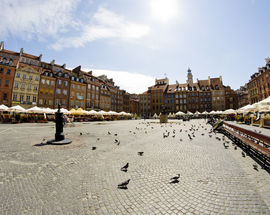
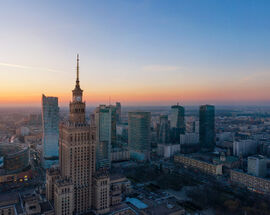
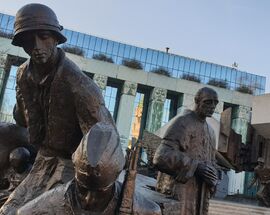
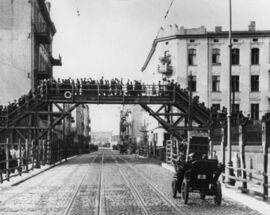
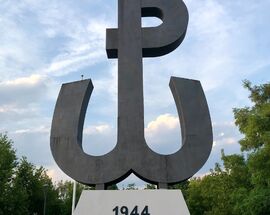

Comments